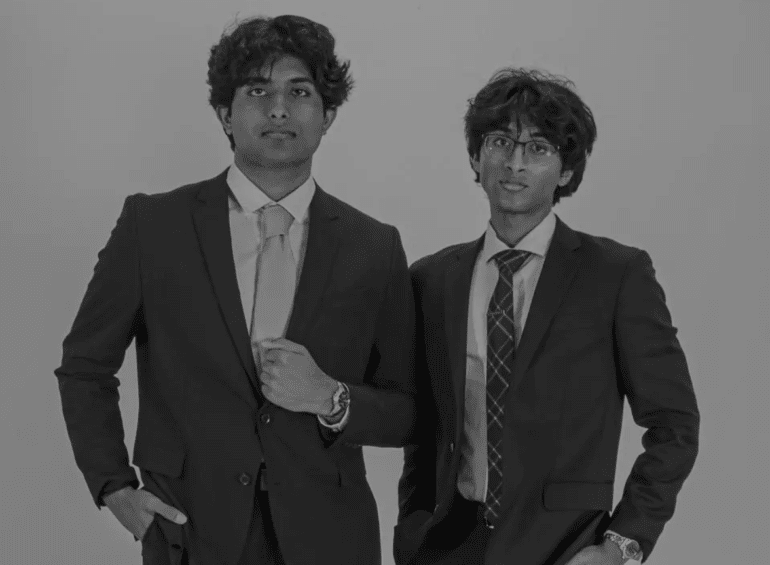TL;DR:
- Vytal.ai, founded by high school students Rohan Kalahasti and Sai Mattapalli, is revolutionizing cognitive health diagnosis.
- Their affordable eye-tracking technology detects ocular biomarkers for neurodegenerative diseases like Alzheimer’s.
- Vytal’s solution, utilizing common laptop and smartphone cameras, offers simplicity and accessibility.
- The startup has gained significant interest, with over 1,000 beta test sign-ups within a week.
- Vytal’s approach balances AI assistance with medical expertise, positioning it as a valuable supplementary tool.
- The founders’ agility and focus on product-market fit secured substantial funding, valuing Vytal at $12.5 million.
Main AI News:
In the midst of typical teenage summer pursuits, such as beach outings and sleep marathons, Rohan Kalahasti, 18, and Sai Mattapalli, 17, dared to dream bigger. These ambitious high school students, who first crossed paths as freshmen at the prestigious Thomas Jefferson High School for Science and Technology, set out to transform the landscape of cognitive health diagnosis. Their brainchild, Vytal.ai, endeavors to democratize eye-tracking technology, unlocking the potential to detect ocular biomarkers signaling conditions like Alzheimer’s and other neurodegenerative diseases.
Their story is not just about youth-driven entrepreneurship; it’s a testament to innovation’s power to simplify and democratize healthcare technology. While eye-tracking for brain health is not entirely novel, Vytal’s approach shines in its simplicity and affordability. In a realm where bulky eye-tracking equipment often demands a hefty price tag exceeding $4,000, Vytal harnesses the ubiquity of laptop and smartphone cameras to swiftly perform eye-tracking and biometric assessments within minutes, all from the comfort of your home. Kalahasti’s epiphany for Vytal took root during a three-year stint at Harvard Medical School, where he delved into gaze tracking. Recognizing the eyes as a real-time “window” into moment-to-moment brain function, he realized that subtle shifts in gaze patterns could potentially signal emerging neurological issues.
The duo, driven by a desire to serve the often overlooked elderly population, aims to empower individuals with early detection capabilities. “In conditions like Alzheimer’s, early detection can truly alter the course of the disease,” Kalahasti explains, emphasizing the impact of their mission. Their dedication is palpable, as they sacrifice school and social interactions to nurture Vytal. In just one week, their startup’s beta test waitlist has already attracted over 1,000 sign-ups, and they’re poised to initiate rigorous user testing at a local retirement home.
Vytal’s inception germinated from a realization that often divides groundbreaking academic research from practical implementation. Mattapalli, drawing from his own experiences, notes, “Every day, remarkable discoveries remain confined to research papers.” Vytal emerged as a bridge, commercializing eye-tracking technology to assist in diagnosis. Their initial prototype utilized deep learning to directly analyze gaze patterns and pinpoint specific diseases. However, consulting with medical experts led them to pivot towards providing more general biomarker scores to complement physicians’ assessments instead of replacing them. In Mattapalli’s words, “Doctors, given their clinical expertise, are perhaps the biggest skeptics of AI on the planet.” By positioning Vytal’s product as a supplementary data source, technology becomes an ally, not a threat.
This pragmatic shift underscores Kalahasti and Mattapalli’s profound grasp of product-market fit, a feat uncommon for students their age. It steered them toward prioritizing rapid deployment over perfecting algorithms. “We recognized our approach needed refinement,” recalls Mattapalli, reflecting on a year of technical development. They regrouped, focusing on a business model centered on “iteration before perfection,” as Mattapalli aptly describes it.
Harnessing Vytal’s global outlook, Mattapalli strategically tapped into the rising tide of international startup funding, particularly in India, to court foreign investors. This calculated approach bore fruit, evidenced by a remarkable journey from a $100,000 pre-seed round to a $1.2 million post-seed funding round, led by Powerhouse Ventures partners. Vytal now stands valiantly at a $12.5 million valuation, firmly establishing its foothold in the cutthroat startup ecosystem.
As they open beta sign-ups online and seek academic and industry feedback for final product refinements, Vytal’s unique cross-generational approach may serve as a beacon of inspiration in an aging society. Once launched, Vytal promises to become a pivotal tool for early cognitive decline detection, facilitating informed care and treatment decisions while also serving as a yardstick for brain health measurement.
For these two high school prodigies, the sleepless nights and missed school days suddenly seem insignificant in light of their technology’s potential to effect real change. As Kalahasti asserts, “We may be young, but we anticipate this technology making a tangible difference.”
Conclusion:
Vytal.ai’s innovative approach to cognitive health monitoring, driven by youthful determination, presents a transformative opportunity in the healthcare market. By offering affordable and accessible technology, they bridge the gap between academic research and practical implementation, addressing the pressing need for early detection of cognitive decline in an aging population. With substantial funding and a clear product-market fit, Vytal.ai is poised for significant impact and growth in the competitive healthcare startup landscape.

